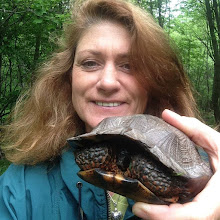Tuesday, May 7, 2013
Latest Letter to the Editor
Once again Spring is upon us. As we all venture out into nature to enjoy the beautiful weather, human encounters with baby wild animals and fledged baby birds sharply increases, as do the phone calls to myself and my fellow wildlife rehabilitators. Although most people only mean well, our local wildlife rarely needs human intervention. Baby animals seem helpless, and are so adorable that they elicit parental instinct for us to try and protect them. It is unfair to them and their parents to inadvertently kidnap them. Their chances of leading a normal life in the wild (if they live) after human intervention, decreases dramatically. Before you *save* a baby animal or bird, watch it from a distance to see if it really needs your help.
The newborn fawn that is sleeping peacefully in your garden or on your lawn in not abandoned. Until he finds his legs over the next week or ten days, he is intentionally parked there by his mom. She has determined that your garden is a safe spot for her precious offspring. Lying motionless, scentless, and with dappled camouflaging fur, the fawn remains undetected by potential predators. Under the cover of darkness, his mom returns several times each night to feed him. She will also encourage him to follow her short distances so that he begins to builds his strength. He will be moved to another location in your yard or your neighbors each night, please share this information with them, so they will leave him be as well. Before you mow your lawn, check the grass for sleeping fawns. If you do accidentally disturb one, chances are Mom is just out of sight and knows exactly where her baby is, give her a chance to get back to him.
If you disturb a nest of baby squirrel by cutting down a tree or removing the nest from a location in or near your house, most mother squirrels if given enough time, will come and retrieve their babies. Mom always has another nest location ready and waiting, just in case. She needs you to put the babies near the original location where she can get to them, and then leave her alone to do her job. She doesn't care if her babies have been touched by human hands, in fact no species of mammal or birds cares, it is a myth that animals are affected by smelling a human on their young, their motherly instinct completely overrides your scent.
Mother Cottontail Rabbit only feeds her liter two times each day, at dawn and dusk. She stays in the nest for only a few moments, so not to attract predators. Rabbit nests can be anywhere in your yard or garden. The nest is usually located in a small dug out depression in dirt. It lined with fur and covered with grass. If you or your pet accidentally disturb a nest, fix it up and put the babies back in it. Mom will be back at dusk to feed her young. Bunnies mature quickly, and are out and on their own by 4 weeks of age. They are still very small, but completely capable of caring for themselves. Monitor your dogs and keep your cats inside as they mature. Cat bites to baby bunnies are usually fatal. Bunnies do the worst of all mammals we take in to rehab, we lose more then half of them. It is heartbreaking for a rehabber to put so much time and energy into rearing them, only to have them die suddenly.
Fledgling baby birds are suppose to be out of the nest. They are covered with feathers, have short tails, and can hop and fly short distances. Over the course of days to more then a week they hop on the ground and in the bushes as they learn to fly and forage for their own food. Although you might not see them, Mom and dad are near by, still feeding them multiple times each day. This is the most critical learning time of their lives, and they need us and our pets to stay away from them as they learn to survive on their own. If you find a baby bird with no feathers, see if you can locate the nest and put the baby back. Mom and Dad are always the best choice to raise and teach their baby to become a wild bird.
On a final note, if you happen upon a turtle crossing the road on it's way to its annual nesting area, please give it a break, and only if you can do so safely, move it across the road in the direction it is traveling. Please don't take the turtle home or move it to another location that you feel might be a better habitat. Turtles live for decades and know their home territories intimately. Moving them to another location most often results in death, as they will try to find their way back to their home territory. If you find a turtle that has been hit and killed, let me know, and I can see if we can't save it's eggs and at least give the next generation a chance.
I thank you all for caring so deeply about our local wildlife. If you have any questions or truly do need to find a NYS Licensed Wildlife Rehabilitator, please don't hesitate to call me, I will help you in any way I can.
Subscribe to:
Post Comments (Atom)





No comments:
Post a Comment